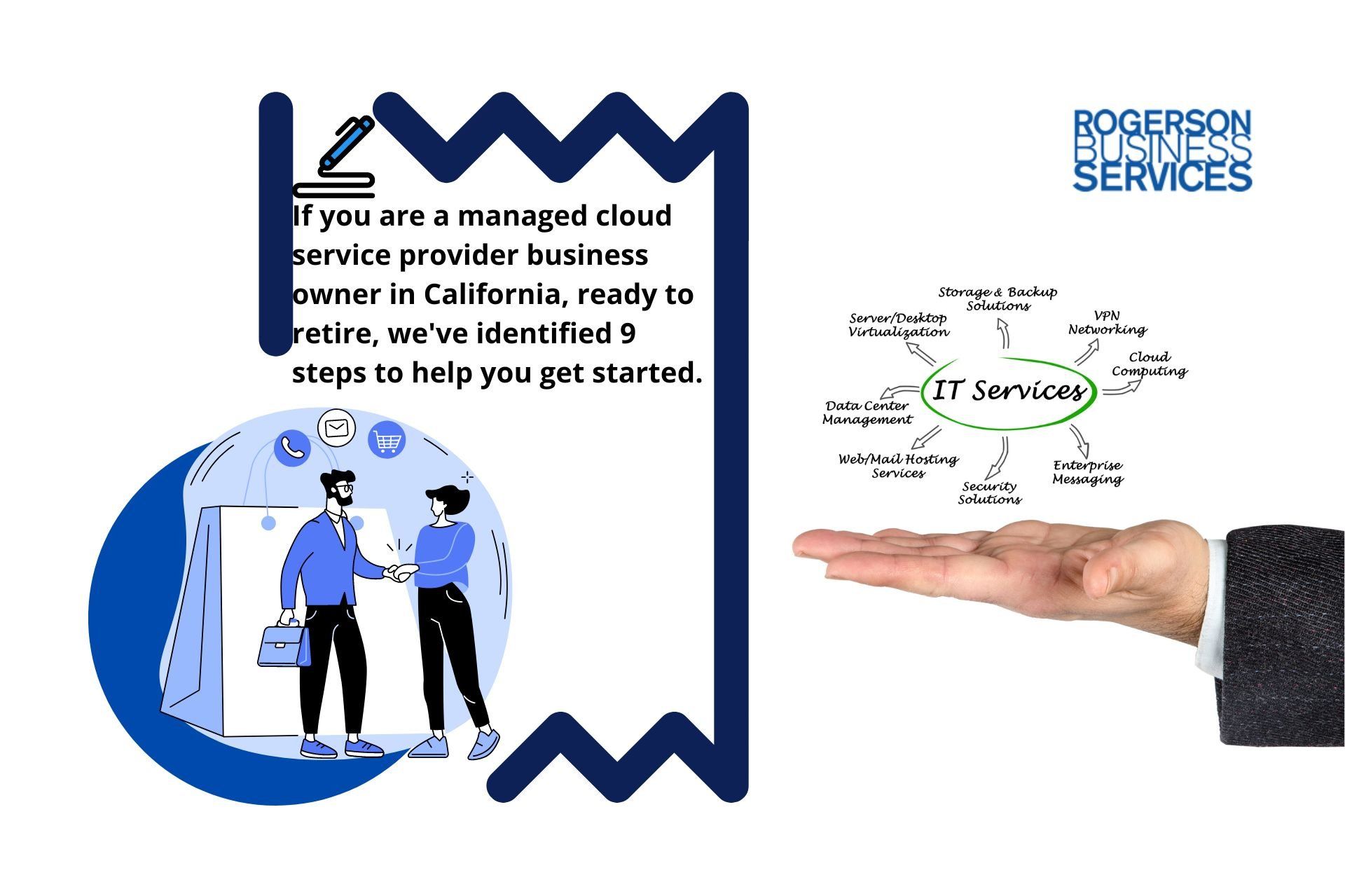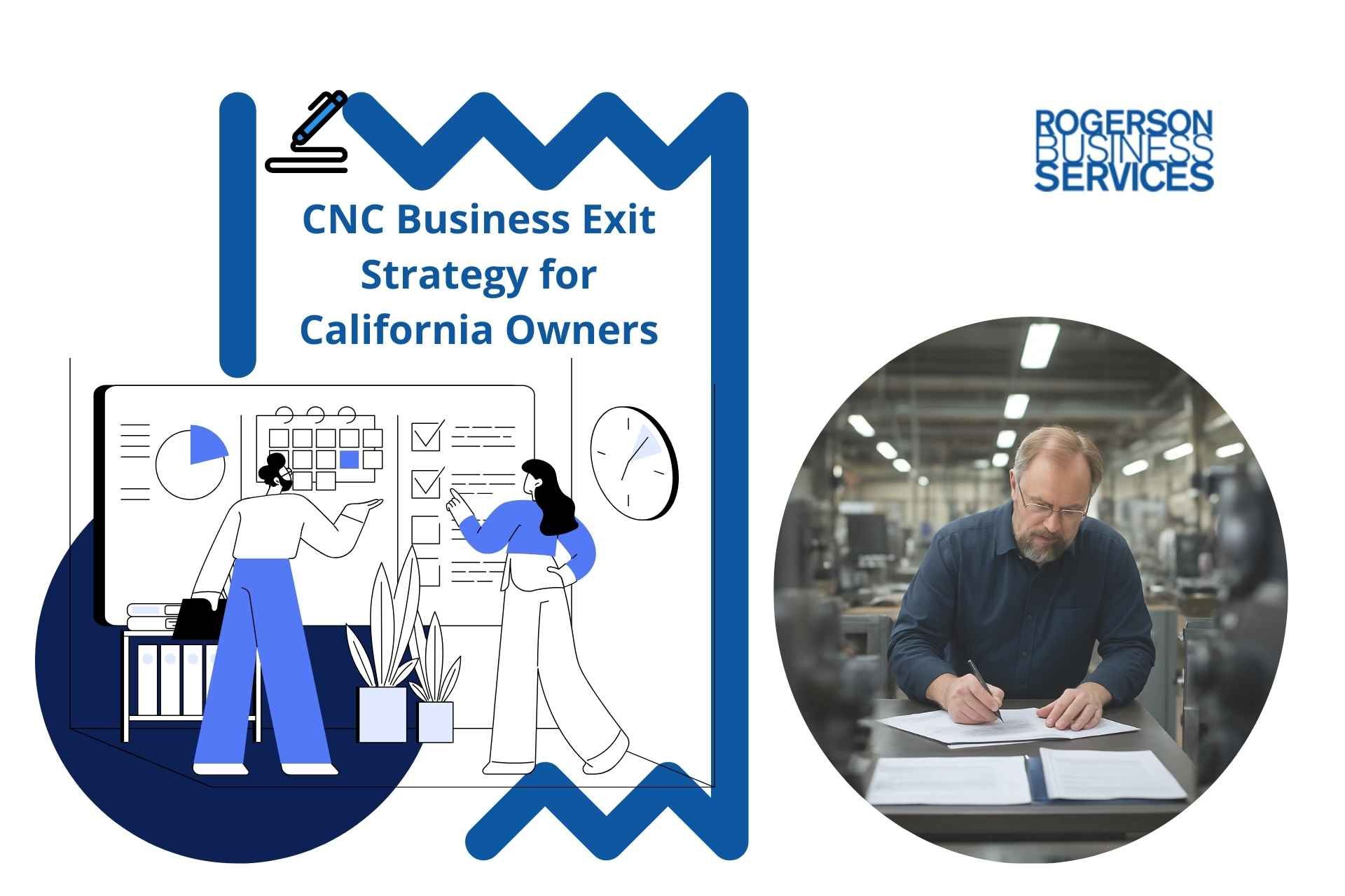Sell Your Managed Cloud Service Provider Business | Get Acquired
Sell Your Managed Cloud Service Provider Business
If you are a managed cloud service provider business owner in California, ready to retire, we've identified 9 steps to help you get started.
- Find what is your business worth
- Get your financial records in order
- Market your business sale - get qualified buyers
- Qualify for the best opportunity - screen buyers
- Negotiate the deal
- Finalize the sale
- Transition the business
- Celebrate
- Say goodbye

As a lower-middle-market business owner in California and ready to retire, you may be looking to sell your managed cloud service provider company, it can be hard to know how to begin the process of selling lower middle-market businesses. We have identified nine steps to help you start the process of valuing and selling your business so you can get the best price for it.
Selling your cloud services company isn't always easy, but the process should be as stress-free as possible. Equipping yourself with all the necessary information regarding selling a business is crucial to mitigate the risk of anything going wrong in the process.
With this guide, you'll have everything you need to sell your MCSP business for everything it's worth.
1. Determine the Value of Your Business
The first step in selling your business is to determine its value. Understanding the true value of your business helps you know how to market it, who to market to, and how to negotiate for what it's worth.
You can do this through various methods, such as an appraisal or a broker's opinion of value. You can contact your local business appraisers or even start a business valuation yourself. Find out how your business' worth compares to others on the market by calculating your EBITDA.
EBITDA is an especially useful calculation for managed CSP cloud service provider businesses. Most potential buyers and sell-side brokers will want this information anyways, and it's always helpful to know where you stand before contacting appraisers.
You can ensure you get appraisals and offers that accurately reflect what your business is worth by doing your valuation calculations.
If you don't want to do your calculations, that's fine. You can hire a professional to do an appraisal on your business, and they will cover all of the valuation work. Depending on the broker you hire, they may also be able to complete the valuation for you.
2. Get Your Financials in Order
Once you have determined the value of your business, you will need to get your financials in order, meaning compiling all of your financial statements and tax returns for the past three years. If you attempt to calculate your business' EBITDA, you will need to get these statements together anyways.
Some additional financial documents you should have prepared include:
- Cash flow statement
- Profit and loss statements
- Insurance policies
- Current balance sheet
- Distributor contracts
- Customer / client list
Organizing and reviewing your financial documents and information is crucial for beginning to market your business to potential buyers while also allowing you to be aware of any areas of improvement.
Depending on when you want to sell your business, you may be able to develop plans for improvement to help the chances of selling your business for the best price.
Need more help to know all the documents needed to exit/sell/transition your business? Download this ExitPrep Checklist
3. Market Your Business
The next step is to market your business to potential buyers. There are several methods to market your business, such as advertising or hiring a sell-side advisor, a middle market business broker, or an IT business broker.
Mergers and acquisitions (M&A) Business brokers save you time as they take care of all the complicated aspects of selling a business, like finding and vetting potential buyers and maximizing negotiations. However, If you hire a broker, you have to pay the broker's commission.
Paying a broker can add up fast, but it also allows you to focus on your business and maximize your profits until the sale is finalized. Of course, selling your business without a broker is also possible, but be aware not to fall into these pitfalls.
Although time-consuming, you will save money by not having to pay a broker. However, business brokers are experts for a reason. So even if it is costly, a trusted business broker can ensure you get the deal your business deserves.
Whether you decide to hire a broker or market your business on your own, the advertising will be the same. Advertising your business on platforms such as LinkedIn can help make sure you find qualified buyers interested in your business. Try to find online forums and hubs for managed cloud service providers specifically, as you'll be able to find buyers who are experts in your industry.
Lastly, you should utilize your network of connections in the managed service provider (MSP) industry to locate companies and experienced workers who may be interested and qualified to purchase your business.
Perhaps you already have an employee or family member in mind, but you must ensure they are serious about taking over the business and everything that comes with it.
4. Screen Potential Buyers
Once you have received interest from potential buyers, it is important to screen them carefully to ensure they are serious buyers and will go through with the purchase. If you've hired a business broker, they will help you through this process.
To confirm a buyer is serious, you can request they submit a written expression of interest. Additionally, before showing potential buyers any sensitive documents such as client lists, you can have them sign a Non-Disclosure Agreement (NDA).
Even if a buyer proves they want to purchase your IT services business, they may lack the required experience and skills necessary to take over a managed cloud service provider business.
Consider developing criteria to use so that you can easily screen and sort through buyers who initially respond to your ads. Some criteria you could use to filter buyers include:
- Does the buyer have experience or interest in your specific field, managed cloud service providers, or managed service providers?
- Does the buyer have the required education, licenses, certifications, or experience to run a business, specifically a managed service provider?
- Can the buyer purchase within your desired time frame?
- Can the buyer make your closing day pay requirements?
Once you have narrowed down your prospective buyers, you should require them to submit documents that confirm their identity, financial abilities, and commitment. Documents to verify buyers could include but are not limited to:
- Tax statements
- Licenses
- Copies of prior financial statements and documents
Have you already tried to sell your IT services business on your own, and failed to find a buyer? Get Qualified Buyers
5. Negotiate a Deal with a Buyer
Once you have found a buyer interested in purchasing your business, it is time to negotiate a deal with them, which can be a lengthy process, and it is vital to ensure you get the best price for your business.
Negotiation is a process where a certified business broker is especially helpful, as they have experience negotiating with buyers to get the highest possible profit for you.
Negotiating a deal could always go wrong, so it's essential to be prepared for this process and consider having the buyer sign a purchase letter of intent (LOI) Similar to a letter of written interest, a letter of intent to purchase puts the time frame, purchase range, and other criteria in writing so there are no surprises.
During this process, your buyer may also want to go through due diligence to ensure they are also getting the right price for the sale. Make sure to cooperate during this process to ensure you both stay on the right page.
6. Finalize the Sale
Once you reach a deal with a buyer, it is time to finalize the sale of your business, which includes transferring ownership of your business and completing any necessary paperwork.
Complete a sales agreement document detailing the purchase of assets or stocks, the inventory of the sale, how it will run leading up to close, broker fees, and other terms of the agreement. A broker can ensure all of the small details are covered and that your buyer completes the final payments.
Do you want to know how the selling process actually looks like? Walk me through a sell-side process
7. Handle Post-sale Matters
After the sale of your managed cloud services business is finalized, you'll need to handle all the post-sale matters, such as closing out bank accounts, transferring passwords, and transferring licenses or permits.
Do you want to know who gets the cash in the bank? Yes, I'd like to learn more
Post-sale duties could also include agreements made in the sales agreement document. Make sure to follow the plan set in the sale agreement for how you will handle and run the managed cloud service provider business until you transfer it to its new owner.
Lastly, finish paying your broker's commission and going through any other paperwork your broker may need from you.
8. Celebrate!
Finally, once you've handled all the post-sale matters, it is time to celebrate! Selling your cloud IT services business can be an exciting time, so you should take some time to enjoy it.
The stress, hard work, and tedious paperwork are over, so you can enjoy the benefits of selling your managed cloud service provider business. Consider celebrating with former employees and even the new owner of your business to remain on good terms.
9. Say Goodbye
Finally, it is time to say goodbye to your business and all the hard work you put into it over the years. It is bittersweet but knowing that you sold it for the best price makes it all worth it.
It can be hard to let go of something you might have started, acquired, or passed down from your family and ran for many years, but now you can enjoy the retired life and know that your company is in good hands.
Conclusion
Selling your IT managed service provider (MSP) business in the lower middle market in California is a life changing event that requires forethought and careful planning. Before selling your business, know its worth in both tangible and intangible assets. Find a reliable professional representative like a certified business intermediary specialized in M&A deals to manage the process while you continue to maintain your business. The IT broker will do the heavy lifting by marketing to and negotiate with vetted buyers and close for a reasonable price.
See how Rogerson Business Services sold businesses in California by Visiting These Case Studies.
If you have decided to value and then sell your IT services business now or within the next six months, click here to get started with this quick and simple form, so we can understand your pain points better and prioritize your inquiry with RBS Advisors.
Go to the next article: Part of tips to selling an Information Technology Services Company in California series ->
Hey there! Can we send you a gift?
We just wanted to say hi and thanks for stopping by our little corner of the web. :) we'd love to offer you a cup of coffee/tea, but, alas, this is the Internet.
However, we think you'll love our email newsletter about building value and properly position your company before transition/exit your business ownership.
As a special welcome gift for subscribing, you'll also get our helping and educational guides, tips, tutorials, etc.. for free.
It's filled with the best practices for retiring serial business owners like Dan Gilbert, Larry Ellison, Warren Buffett, and many more.
Just sign up for our emails below.


